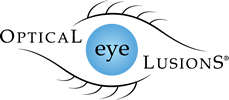Specialist Contact Lenses
Your eyesight deserves the highest standards of professional eyecare…
Specialist Lenses
If you have had trouble wearing contact lenses or have been told you’re not a good candidate for “contacts”, you simply may have eyes that are “hard to fit.”
This doesn’t necessarily mean you can’t wear contact lenses, and at Optical eye Lusions we specialise in advanced contact lens fittings.
Any of the following conditions can make contact lens fitting and comfortable contact lens wear more challenging:
- Keratoconnus
- High Astigmatism
- Post -Refractive Surgery
- Presbyopia
Contact Lenses For Keratoconus
If you have keratoconus and cannot see as clearly as you would like to with spectacles, you typically will see better if you are fitted with contact lenses specially designed for irregular corneas.
Contact Lenses For High Astigmatism
Contact Lenses Following Refractive Surgery
Contact lenses also can help to address laser complications, such as indistinct vision from aberrations which can produce vision errors such as difficulty seeing at night, glare, halos, blurring, starburst patterns after surgery. Gas permeable or hybrid contact lenses usually are the preferred lenses for this problem.
Keep in mind that fitting contact lenses after surgery might require more trial lenses and a longer period of time than fitting contact lenses on an eye that hasn’t had surgery.
Contact Lenses For Presbyopia
Like progressive spectacle lenses, multifocal contact lenses have a more complex design than regular lenses, and precise fitting is essential for good results. Therefore, finding the best contact lenses to correct presbyopia typically is more time-consuming than a regular contact lens fitting. But the result usually is worth the extra time and expense. Improvements in multifocal contacts have increased satisfaction with these lenses in recent years, and most wearers are very pleased about how the lenses reduce their dependence on reading spectacles.
